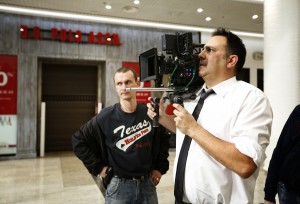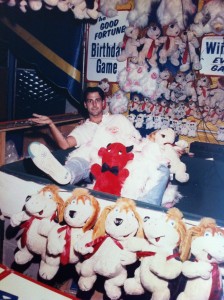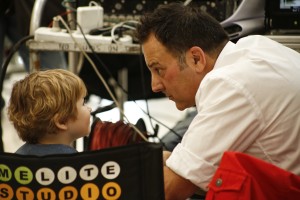Scotty Bergstein arrives at our studio in a grey jacket, white shirt, and thin black tie.
PRODUCTION INC: Did your wife dress you today?
SCOTTY: No, if she did I would look cool.
PRODUCTION INC: Do you wear a tie every day?
 SCOTTY: On occasions and whenever I am either in front of the camera or behind it.
SCOTTY: On occasions and whenever I am either in front of the camera or behind it.
PRODUCTION INC: Superstition?
SCOTTY: More out of respect. When I first came to Hollywood, I was mentored by a very successful producer who wore a white shirt and black tie every day. He said to me, “you should wear a tie every day too, it will set you apart.” I explained to him that one of the perks of becoming a filmmaker is you don’t have to wear a tie every day. “Tell that to Billy Wilder and Alfred Hitchcock,” he said. It wasn’t long after that, this producer, who had become a very dear friend, passed away unexpectedly. So, out of respect for him, and out of respect for the agency folk and the crew who work so hard to make what I do a success—and of course for Billy Wilder and Alfred Hitchcock, I carry on my friend’s tradition of wearing a tie.
PRODUCTION INC: How did your childhood influence you as a director?
SCOTTY: The summer months of my childhood had a great influence on my directing. It was during those months I would travel with my grandparents who owned a traveling county fair, otherwise known as the carnival circuit. My first carni job was as a salesman of sorts. I was nine years old and I would walk around the carnival with my Grandmother or fellow carni worker, and carry a big stuffed animal so carnival goers would think that I had won it at one of the many gaming stations. Was it really possible to win a big stuffed animal, nearly the size of me? It was possible, but you would have to drop a lot of dough in order to do so—and I’m not talking churros.
PRODUCTION INC: So selling carnival goers on the perception of winning large stuffed animals influenced you as a director?
SCOTTY: No, not exactly, I just wanted to use the word, “churro” in a sentence. What influenced me in those carni days, were all of the characters I met along the way, also known as “freaks” in the freak show. There was the Fortune Teller, the 500 pound tattoo lady, the Hindu sword swallower, and Little Pete—the famous dwarf who pretty much ran the place. And because these eccentric characters became so normal to me, we worked together, played together, they were like an extended family… I realized they were just like everyone else, that they weren’t really “freaks,” after all. And that’s when the light bulb when off inside my head and I realized—no matter who you encounter in life, even those who you may think so… the fact is, none of us are normal.
PRODUCTION INC: Is it true you dated a headless woman?
SCOTTY: Well, I didn’t have much of a choice; it was either her or the bearded lady. The fact is, Carnivals and the sideshows are exactly that, a show, and these are performers. Sure, some of it is real—the snake charmers, the body builder, the double jointed wonder, but thankfully, the headless woman, who appeared to have blood coming out of her neck, was all smoke and mirrors, literally. Thinking back, it was these characters that helped shape the types of actors I like cast.
PRODUCTION INC: Were there any industry professionals or films that influenced you?
SCOTTY: Part of the reason I became a filmmaker was I saw the effect it had on people, and I was no exception. It actually affected my older brother first. He was in dental school when he and I saw “Top Gun” together. Because of that film he gave up dentistry to become a fighter pilot. Thankfully, films like “Psycho” didn’t have the same effect on us, but John Hughes had a profound effect on me. The way he would mix together the real with the whacky characters and weave them seamlessly into a story we could identify with was amazing to me. I learned from John Hughes films, if you can successfully combine poignancy and humor, then your story will come across in a funny and memorable way.
PRODUCTION INC: How you do you think comedy helps sell a brand?
SCOTTY: Comedy can hurt every bit as much as it can help. If the comedy is like the party joke you laughed at (or not) and cannot remember the next day, then it can potentially have the same effect on the brand itself. But, if all of the elements come together in a meaningful way, then message will stay on the mind of the consumer.
PRODUCTION INC: So, how do you get the message to stick?
SCOTTY: I get it to stick by trusting my process. I have worked all over the world, experienced different languages, different cultures and different senses of humor. I learned that nothing is universally funny, so you have to be who you are, yet adapt to who they are. As cliché as it may sound, comedy boils down to a simple truth: If they don’t get the joke, they won’t think it’s funny. By trusting yourself, I mean you may not be able to tell the same joke, but you can tell a different joke the same way.
PRODUCTION INC: What do you trust in yourself in terms of directing comedy?
 SCOTTY: To me the most important element in directing comedy is subtleness. I know that may be an unflattering word when it comes to comedy, but what I mean is, for me, comedy is about being smart and not being overtly funny. I don’t go for the whacky joke, the Dutch angle, or wide angle lens, I go for the genuine moment, that moment when the actor is not trying to be funny, but is funny. Now, don’t get me wrong, I love a fart joke as much as anyone—the human being farts an average of 14 times a day and usually 13 of those are potentially very funny, but it doesn’t take a lot of talent to do what everyone can do and is doing…
SCOTTY: To me the most important element in directing comedy is subtleness. I know that may be an unflattering word when it comes to comedy, but what I mean is, for me, comedy is about being smart and not being overtly funny. I don’t go for the whacky joke, the Dutch angle, or wide angle lens, I go for the genuine moment, that moment when the actor is not trying to be funny, but is funny. Now, don’t get me wrong, I love a fart joke as much as anyone—the human being farts an average of 14 times a day and usually 13 of those are potentially very funny, but it doesn’t take a lot of talent to do what everyone can do and is doing…
Scotty’s eyebrows furl, he takes a moment, thinking…
SCOTTY: Smell that?
CLICK HERE TO SEE SCOTTY’S WORK
Leave a Reply